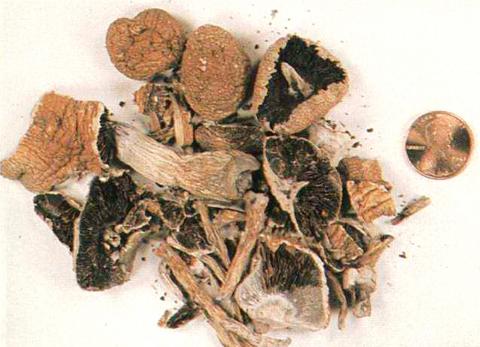Authorities have issued a warning after “magic mushrooms” were found growing at a popular pasture in Yangmingshan National Park (陽明山), saying the fungi are classified as a “Category 2” illegal drug.
Taipei’s Seventh Special Police Corps (保七總隊), in charge of public safety at Yangmingshan park, said they were alarmed at the discovery of “magic mushrooms” and have beefed up patrols in the park, which is frequented daily by city residents, hikers and tourists.
“We are paying close attention to this case and a team was dispatched this morning to collect the mushrooms. They will be sent for lab analysis,” said Wang Chi-cheng (王志成), head of the criminal investigation unit at the Seventh Special Police Corps.

Photo provided by the Criminal Investigation Bureau
“Before making a proper identification, we have reinforced patrols throughout all areas of Yangmingshan,” Wang told reporters.
The beefed-up patrols are needed because authorities have become aware of reports of the mushrooms creating a buzz both online and off the Web, mostly due to unfamiliarity and curiosity about this particular wild fungus with hallucinatory and psychedelic properties, Wang said.
According to a Chinese-language Apple Daily report on Monday, a man from Taipei surnamed Huang (黃) last month went to park’s Qingtiangang (擎天崗), a scenic mountain pasture still used by local farmers to graze cattle.
Huang said he found wild mushrooms, mostly white in color, growing on the cow dung. Thinking they were edible, the 24-year-old picked a bunch and took them home. He made a vegetable stir-fry with the mushrooms and consumed the dish.
Huang recalled that he began to experience something unusual.
“I felt light, like my body was floating in midair. I saw strange things and space seemed distorted. I also had this uncontrollable drooling,” he said, according to the newspaper report.
After coming down from the hallucinatory trip, which lasted about two hours, Huang was frightened and told a friend about the experience, who was certain Huang had eaten “magic mushrooms.”
According to experts, Huang had eaten psilocybin mushrooms, which contain the active ingredients psilocybin and psilocin.
Chen Chi-chen (陳啟禎), a biology professor at Southern Taiwan University of Science and Technology, said some indigenous people of central America used psilocybin mushrooms to induce psychedelic experiences during traditional ceremonies and religious rituals.
“In this case, the mushroom spores were eaten by cattle and expelled in their feces. When suitable temperature and humidity conditions were met, they sprouted on the dung and grew into mature mushrooms,” Chen said.
“They can also grow on other cool and wet mountain slopes around Taiwan, not just on Yangmingshan,” he added.
On Tuesday, the Food and Drug Administration issued a statement warning the public not to pick any wild mushrooms found in mountainous areas and not to eat them.
“Psilocybin mushrooms affect the central nervous system, lead to muscle weakness, and may cause convulsions and lead to death in serious cases,” the administration said.
The statement stressed that psilocybin mushrooms are illegal in Taiwan, as they are considered a “Category 2” drug, alongside marijuana and amphetamine.

Chinese Nationalist Party (KMT) Chairman Eric Chu (朱立倫), spokeswoman Yang Chih-yu (楊智伃) and Legislator Hsieh Lung-chieh (謝龍介) would be summoned by police for questioning for leading an illegal assembly on Thursday evening last week, Minister of the Interior Liu Shyh-fang (劉世芳) said today. The three KMT officials led an assembly outside the Taipei City Prosecutors’ Office, a restricted area where public assembly is not allowed, protesting the questioning of several KMT staff and searches of KMT headquarters and offices in a recall petition forgery case. Chu, Yang and Hsieh are all suspected of contravening the Assembly and Parade Act (集會遊行法) by holding

PRAISE: Japanese visitor Takashi Kubota said the Taiwanese temple architecture images showcased in the AI Art Gallery were the most impressive displays he saw Taiwan does not have an official pavilion at the World Expo in Osaka, Japan, because of its diplomatic predicament, but the government-backed Tech World pavilion is drawing interest with its unique recreations of works by Taiwanese artists. The pavilion features an artificial intelligence (AI)-based art gallery showcasing works of famous Taiwanese artists from the Japanese colonial period using innovative technologies. Among its main simulated displays are Eastern gouache paintings by Chen Chin (陳進), Lin Yu-shan (林玉山) and Kuo Hsueh-hu (郭雪湖), who were the three young Taiwanese painters selected for the East Asian Painting exhibition in 1927. Gouache is a water-based

Taiwan would welcome the return of Honduras as a diplomatic ally if its next president decides to make such a move, Minister of Foreign Affairs Lin Chia-lung (林佳龍) said yesterday. “Of course, we would welcome Honduras if they want to restore diplomatic ties with Taiwan after their elections,” Lin said at a meeting of the legislature’s Foreign Affairs and National Defense Committee, when asked to comment on statements made by two of the three Honduran presidential candidates during the presidential campaign in the Central American country. Taiwan is paying close attention to the region as a whole in the wake of a

OFF-TARGET: More than 30,000 participants were expected to take part in the Games next month, but only 6,550 foreign and 19,400 Taiwanese athletes have registered Taipei city councilors yesterday blasted the organizers of next month’s World Masters Games over sudden timetable and venue changes, which they said have caused thousands of participants to back out of the international sporting event, among other organizational issues. They also cited visa delays and political interference by China as reasons many foreign athletes are requesting refunds for the event, to be held from May 17 to 30. Jointly organized by the Taipei and New Taipei City governments, the games have been rocked by numerous controversies since preparations began in 2020. Taipei City Councilor Lin Yen-feng (林延鳳) said yesterday that new measures by